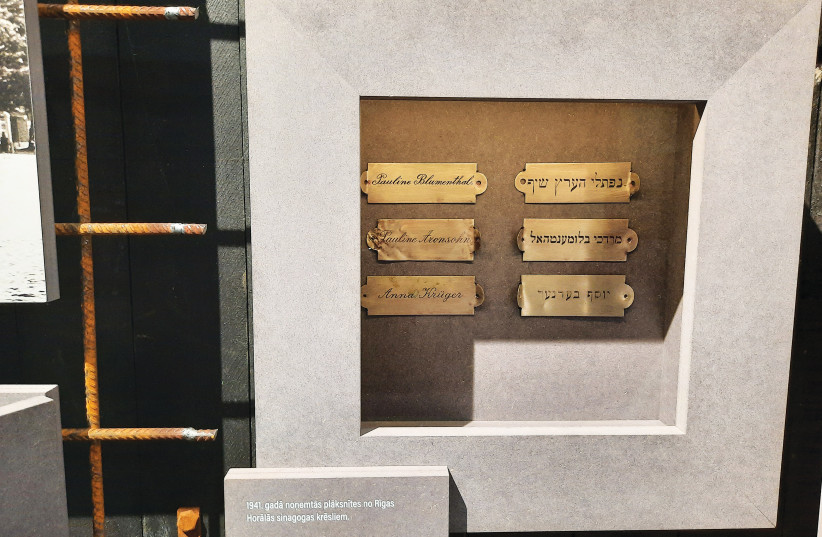Yizkor has always been a prayer shrouded with emotion, drama and superstition for me. Older generations, including my parents, shooed us away as Yizkor was about to begin – fearful that we would be tainted from the sadness in the room or that our very presence would have morbid consequences. I well recall how the younger generation was ushered out of the synagogue while a few stole a glance at the sad countenance of those who remain to recite Yizkor.
I have now been saying Yizkor for seven years. The drama, superstition and emotion has not waned. I too shoo my children to join the exodus of those who have the privilege not to recite the names of their departed parents and dear ones.
However, Yizkor on Yom Kippur 5784 – this year – was different. A few hours before Kol Nidre began, I returned to my home in Jerusalem following a work-related trip, on behalf of Yad Vashem, Israel’s Holocaust Martyrs’ and Heroes’ Remembrance Authority, to Vilnius, Lithuania, and Riga, Latvia.
In both locations I was there to attend Holocaust-related events and meet officials in order to promote the study of the Shoah. My packed schedule included briefings, meetings and study tours of memorials and museums – including the Museum of Occupation of Latvia. As we were walking through the exhibit, just hours before Shabbat, my guide showed me six small plaques that had been retrieved from seats in the Choral Synagogue in Riga. This synagogue, along with some of its members, was set ablaze and destroyed on July 4, 1941 by Latvian supporters of the occupying Nazi forces.

A sudden realization
I was caught completely off guard by this small display. Who removed these plaques and how did they end up in this museum? I found myself staring at the names of six “shul goers” in awe, realizing that I am probably the only one in the stream of visitors around me who can read their Jewish names in Yiddish and Hebrew.
The next day, on Shabbat Shuva, I visited what remains of the destroyed Choral Synagogue in Riga. I said kaddish for the once vibrant Jewish community that thrived and is no more. I prayed also for those innocent Jews murdered by the Nazi racist and antisemitic ideology and the local collaborators who aided in the extermination of Jews during the Shoah. Shortly after Shabbat ended, I returned to Israel for Yom Kippur but my thoughts lingered on these six “shul goers.”
HOURS LATER, back in my own shul in Jerusalem, during my recitation of Yizkor, I couldn’t help but think about how these Riga shul goers might have once recited Yizkor in their synagogue on Yom Kippur for their loved ones. Now, nearly eighty years later, my thoughts then turned to the fate of these six Jews and the question of who is left to say Yizkor for them.
Some 90,000 Jews lived in Latvia prior to the German occupation in the summer of 1941. In the days preceding the German occupation some fled, but around 70,000 remained and, by the end of 1945, only 200 Jews remained on Latvian soil.
Recording and researching names
Since I have spent the past thirty years working for Yad Vashem, I felt compelled to record and research the names on the plaques in our databases. Unfortunately, detailed information about these six individuals is rather scant; however, we do have copies of some personal documents – which were collected by the local authorities during the Holocaust – for the three women.
Pauline Blumenthal was born in Jelgava, Latvia, in 1868. According to her identity card, she had voted in the 1928 and 1931 parliamentary elections. In 1941, she would have been 73 years old.
Pauline Aronsohn was born on January 14, 1855. She was murdered in 1941, age 86 years old.
Anna Kruger, daughter of Ella and Ovsey Kruger, was born in Riga. Years later, in 1978, her first cousin from Manchester recorded her name on a Yad Vashem Page of Testimony. Both her date of birth and where and when she was murdered remain unknown.
Unfortunately, our initial research for information about Naftali Hertz Schiff, Mordechai Blumenthal, and Yosef Berner has not yet yielded results. Our quest for their identities continues.
As we enter the holiday of Shmini Atzeret on the coattails of Sukkot, we will once again be reciting the revered Yizkor prayer. During the upcoming Yizkor, and perhaps future Yizkor prayers, I will not only recite my usual list, but also add these six names of Jews from Riga whose seats in their beloved Choral Synagogue will never be reserved again.
The writer is the director of the Global Initiatives Department in the International Affairs and Communications Division at Yad Vashem, the World Holocaust Remembrance Center in Jerusalem.
